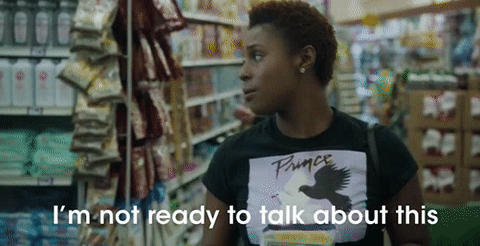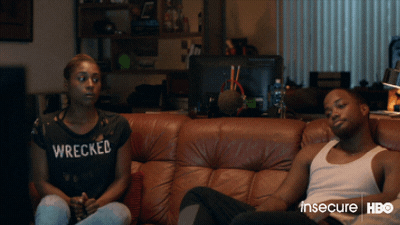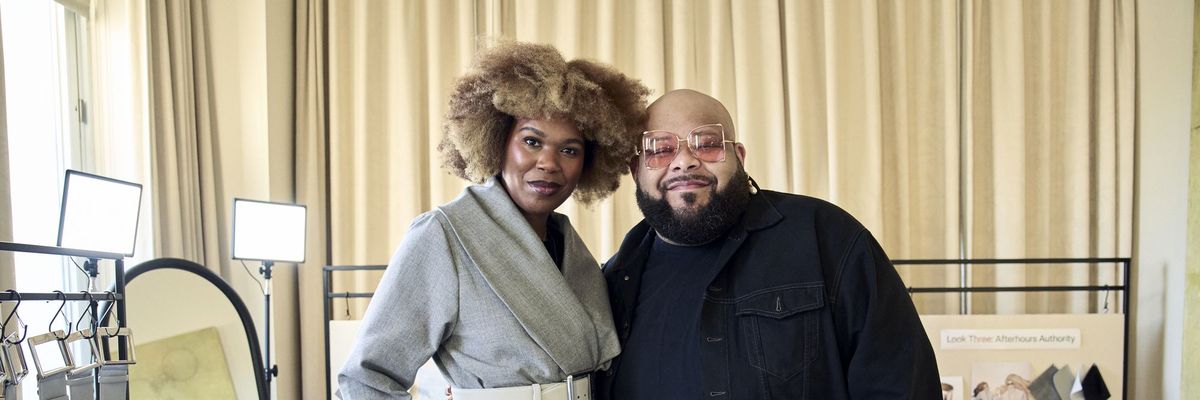
Whether you ever intended on watching Tyler Perry's Why Did I Get Married? and Why Did I Get Married Too?, for better or for worse, BET doesn't really give you much of a choice. It seems like at least once a week, one or both films are airing on that channel. And, if there's a couple that is truly memorable, it's Marcus (played by Michael Jai White) and Angela (played by Tasha Smith).
To call them "dysfunctional" would be a major understatement. They have serious trust issues, their communication sucks, there's little to no respect given, they seem to find extreme pleasure in throwing each other under the bus in front of their friends (especially Angela) and they appear to get on each other's last nerve, more times than not.
I've seen clips of both movies so much that they both seem to run in together at this point. But I do know for sure that, in one of them, there's a scene where Marcus is asked why he keeps putting up with all of the crazy. His response? "The make-up sex is insane!" (or something along those lines).
That's not just a line from a movie. If you put "make-up sex" in any search engine, you're gonna see articles about why so many of us like—no, LOVE—it. From the research that I've done on the topic, a lot of us are super into make-up sex because it tends to be wilder, more exciting and more intense than so-called "regular sex" is. That's cool. But like most things in life, there is such a notion as too much of a good thing.
How can you tell the difference between make-up sex being a hot way to conclude a fight vs. something that is masking a layer of issues that sex alone really can't solve? I've got five points that can at least get you on the path of seeing what's really going on in your bedroom—and ultimately, your marriage.
Is Make-Up Sex How You Always “Resolve” Arguments?

Personally, whenever a couple tells me that they never argue, whether they say it directly on my face or not, I'm giving them the side-eye. While I don't think that every couple has ugly knockout drag-outs, I find it very hard to believe because if two people are being open and honest with one another, sometimes boats are gonna get rocked. And there's nothing wrong with that. We all have our own way of seeing things and oftentimes, looking at another's perspective is just what we need in order to grow as individuals.
The problem with arguing is when a couple has no idea how to resolve their issues when they arise. If there is a lot of grudge-holding, deflecting, hitting below the belt, yelling and screaming or even a ton of passive aggressiveness, not only does this reveal poor communication skills, it will only make matters worse over time.
What really needs to be addressed is the fact that some couples are either so used to arguing that they don't realize how unhealthy their communication is or they are so accustomed to having sex to "fix matters" that, ironically, nothing really ever gets fixed.
I'm big on saying that sex shouldn't be about "making love" so much as celebrating it.
Along these same lines, make-up sex shouldn't be about avoiding resolutions but the celebration of actually coming to one. Which is it for you and yours?
Is Make-Up Sex a Stress Coping Mechanism?

Life has its stress-filled moments. There's no doubt about that. And when it comes to the health benefits of sexual activity, the reduction of the stress hormone cortisol is a strong one. So yeah, I totally get why couples would resort to having sex in order to release a little anxiety and tension. That's not why I'm bringing this point up, though.
It's one thing to have a few days when your schedule has you feeling overwhelmed or to receive some news that's got you a little more than just irritated. It's another to be sick all of the time, an insomniac or noticing things like body aches and hair fall. If these things are transpiring, they're usually red flags that you are too stressed for your own good and all sex is doing is masking a deeper issue.
Sure, sex can distract you for a few minutes (or, if you're lucky, a couple of hours), but the problems are gonna still be there when you're done. If all you really do to handle your stress is having sex, that's something else to really look into; preferably with a therapist and/or physician.
Is Make-Up Sex the Only Time That You Truly Feel Connected?

So, there is such a thing as arousal transfer. What's that? In a nutshell, it's when our bodies go from one kind of stimuli to another and then we pass it on to someone else. In the context of make-up sex, it's basically going from an emotion like anger to another like excitement. Then, when pleasure is brought into it all, it can create the illusion that reconciliation has happened when really all that's gone down is you connected on a physical level (and the oxytocin calmed you down a bit).
Arousal transfer is normal, but if it's the only time you and your partner truly feel like you're on the same page, it's also an illusion. Healthy relationships have mental, emotional and spiritual connections not just physical ones. Healthy couples are able to feel close to one another, whether sex comes into play or not.
Is Make-Up Sex What You Do When You Don’t Know What to Do?
 Giphy
GiphyA lot of us were not fortunate enough to grow up in a two-parent household and/or one that consisted of two people who loved and respected each other and communicated well. Because this was lacking, we didn't really get the foundational skills required to deal with conflict in a romantic relationship.
Two things typically happen because of this. One, we (internally) freak out whenever relational issues arise and/or two, we either think that running from the relationship or doing whatever makes our partner feel better is the solution. And oftentimes, that feel-good-remedy is sex.
The problem with that is even the best (and most realistic) sex only lasts a couple of hours. Once it's over, the problems still exist. If you and yours are always having sex during or immediately following a fight because you don't know what else to do, this is another reason to strongly consider getting into some marital counseling. Just so the two of you can learn how to hash things out and "fight fair" in the process.
Is Make-Up Sex How You “Handled” Relationships When You Were Dating Too?

There is a lot of baggage that many of us bring into our current relationship, oftentimes not realizing it until we get triggered or a particular pattern is brought to our attention. That said, if you can relate to all of what I shared here and a part of you is wondering where it came from, take a brief walk down memory lane to see if make-up sex is how you handled issues with your boyfriends as well.
A huge mistake that a lot of people make in relationships is assuming that what they did in their dating situations won't creep into their marriage. The only way you can be sure of that is by taking the time, as a single person, to do some self-evaluating and healing. If you're just now seeing that make-up sex has been your modus operandi all along, ask yourself two things—1) how did it work for you back then and 2) if it wasn't a big deal, why aren't you still with your exes? Hmm.
Again, make-up sex isn't a bad thing. Not at all. But if you're dependent on it in order to get through the hard/bad times in your marriage, be careful. You might look up and discover that it didn't fix anything. It just bought you more time to not deal with the inevitable—some real serious problems in your relationship.
You might discover that sex was more like icing on a garbage lid than anything. Sweet for a second but what was underneath? Eww.
Featured image by Getty Images.
Related Articles:
Maintenance Sex Could Be The Key To A Successful Marriage - Read More
8 Things You Should Do Daily To Keep Your Relationship Strong – Read More
7 Things Married Couples Do To Damage Their Sex Lives – Read More
5 Reasons Why Every Married Couple Needs A Sex Jar – Read More
- Learn To Fight Fair In Your Marriage - xoNecole: Women's Interest, Love, Wellness, Beauty ›
- How To Argue In Healthy Way In Relationships - xoNecole: Women's Interest, Love, Wellness, Beauty ›
- Sex Is Great But The Relationship Is Bad - xoNecole: Women's Interest, Love, Wellness, Beauty ›
This Is How To Keep 'Holiday Season Stress' From Infecting Your Relationship
Hmph. Maybe it’s just me, but it seems like there is something really weird happening in the fall season air (because winter doesn’t officially begin until December 21) that cuddle season is in full swing while break-up season is as well. In fact, did you know that break-ups are so popular during the holiday season that December 11 is deemed Break-Up Day?
The reasons why relationships shift around this time vary; however, I did both roll my eyes and chuckle when I read that a very popular one is because it’s an easy way to get out of getting one’s significant other a Christmas present. SMDH.
Anyway, I personally think that the less shallow folks out here may contemplate calling things “quits” or they at least distance themselves a bit from their partner (and what I’m referring to is serious relationships) due to all of the stress and strain that oftentimes comes with the holidays whether it be financial, familial, due to their tight schedules or something else.
Listen, I would hate for you and your man to miss the fun and happiness of experiencing this time of year, all because you are so overwhelmed or irritated that you can’t really enjoy it. That’s why I have a few practical tips for how to avoid allowing the typical holiday season stress from INFECTING your relationship.
Manage Your Expectations
 Giphy
GiphyUnmanaged expectations. If there is a main reason why the holiday season tends to be so stress-filled for so many people, I’d bet good money that this is the cause. And when you’re in a long-term relationship, expectations can manifest themselves in all sorts of cryptic and/or unexpected ways. You might have relatives who assume that you are going to be with them for Thanksgiving or Christmas when you have other plans in mind. You might be thinking that you are going to spend one amount for presents while your man is thinking something totally different. When it comes to scheduling, your signals may be crossed.
And you know what? To all of these scenarios, this is where clear and consistent communication come in. Don’t assume anything. Don’t dictate anything either. From now until New Year’s, mutually decide to check in once a week, just to make sure that you are both on the same page as it relates to the holidays and what you both are thinking will come along with it. The less blindsided you both feel, the less stressed out you will be. Trust me on this.
Set (and Keep) a Budget
 Giphy
GiphyOkay, so I read that last year, 36 percent of Americans incurred some type of holiday-related debt. Hmph. Last year, there was still some sense of normalcy in this country, chile, so I can only imagine what finances are gonna look like over the next several weeks. That said, since I don’t know a lot of people who don’t find being broke stressful, make sure that you and your bae set a budget and then stick to it this year — no ifs, ands or buts.
Because really, y’all — it doesn’t make sense to deplete savings and/or max out credit cards for a few days of giggles only to be damn near losing your mind because you don’t know how to make ends meet come Dr. Martin Luther King, Jr. Day.
And by the way, this tip doesn’t just speak to things like food and gifts; I also mean travel. If it doesn’t make a ton of sense (or cents) to be all over the place this year — DON’T BE.
Keep Matthew 5:37 at the Forefront
 Giphy
GiphyIf off the top of your head, you don’t know what Matthew 5:37 says, no worries, here ya go: “But let your ‘Yes’ be ‘Yes,’ and your ‘No,’ ‘No.’ For whatever is more than these is from the evil one.” That verse right there? Oh, it’s a boundaries lifesaver! I say that because do you see “maybe” or “I’ll think about it” in there? Nope. LOL. It says that you should tell people “yes” or “no” and leave it at that — and that complements Anne Lamott’s quote, “’No’ is a complete sentence” impeccably well. Yeah, you’ve got to remember that anything beyond a yes or no to a request is privileged information; you don’t owe anyone details or an explanation.
Besides, if you are really honest with yourself, when someone asks you something and you give a “Umm, let me think about it” kind of reply, more times than not, you already know what your answer is going to be — so why not let you both off of the hook? Give your response. Commit to that. And let everyone (including yourself) get on with their lives and schedules.
I promise you that when it comes to those holiday parties, you are pissing more folks off by not RSVP’ing or doing so and not showing up than just saying, “Thank you but not this year” off the rip.
Remember That Your Personal Space Is Privilege Not a Right
 Giphy
GiphyA friend of mine recently bought a new house and invited me over to come see it. He’s a single man with no children, so as I was taking in all of the space that he had, especially as I walked through his finished basement, I joked about relatives coming to live with him. “Hell no” and “absolutely not” were pretty much his immediate responses as he went on to say that some folks even had the nerve to be offended when he told them that he had no intentions on taking DNA in.
Ain’t it wild how people think that your stuff is their right? And yes, that brings me to my next point. Your home is your sanctuary space. If you want to host folks this year — cool. If not, ALSO COOL. Please don’t let folks (family included) guilt you into how they want you to act or even into what they would do if the shoe was on the other foot. You are not them — and as one of my favorite quotes states, “If two people were exactly alike, one of them would be unnecessary.” (A man by the name Larry Dixon said that.)
Hell, my friends? They know that I am good for sending them random things that they need or even want all throughout the year. Coming over to hang out at my pace, though. Uh-uh. Chalk it up to being a card-carrying member of the ambivert club yet I like keeping my living space personal — and I sleep like a baby, each and every night, for feeling that way.
Always remember that your space, your time, your resources, your energy and shoot, yourself period (including your relationship), are all things that are your own. You get to choose how, when and why you want to share them. The holiday season is certainly no exception.
Cultivate Some “You Two Only” Traditions
 Giphy
GiphyIt’s not uncommon for some couples to hit me up after the holiday season to “detox.” Sometimes it’s due to the financial drama (and sometimes trauma) that they experienced. Sometimes it’s because they allowed their relatives (especially in-laws) to get more into their personal business than they should’ve. More than anything, though, it tends to be because they didn’t get enough quality time together and so ended up feeling “disconnected.”
Please don’t let that happen. Listen, I’m not even a holidays kind of woman and yet, I will absolutely sit myself down with some hot chocolate and chocolate chip cookies to enjoy a Hallmark holiday film or two. Aside from the fact that most of them are lighthearted and sweet, I also like that they usually focus on couples loving on each other amidst all of the holiday beauty and ambiance — which is something that all couples should set aside some time to do.
Maybe it’s a vacation. Maybe it’s a staycation. Or maybe it’s my personal favorite, A SEXCATION. Whether it’s for a few days, the weekend or even overnight — don’t you let the holidays go by without setting aside time for you and your man to celebrate one another. Don’t you dare (check out “Are You Ready To Have Some Very Merry 'Christmas Sex'?”).
GET. SOME. REST.
 Giphy
GiphyI once read that 8 out of 10 people get stressed out over the holidays and 3 out of 10 lose sleep during to it — and when you’re stress-filled and sleep-deprived, that can absolutely lead to hypersensitivity, making mountains out of molehills and even not being in the mood for sex.
Your relationship can’t afford to go through any of this, so definitely make sure to prioritize rest. I don’t care how unrealistic it might seem during this time, sleep should never be seen as a luxury; it will always and forever be a great necessity.
That said, try to get no less than six hours of shut-eye in (check out “6 Fascinating Ways Sex And Sleep Definitely Go Hand In Hand”) and even ask your bae to take a nap with you sometimes (check out “Wanna Have Some Next-Level Sex? Take A Nap, Sis.”). Not only will sleep help to restore your mind, body and spirit but, when it’s with your partner, it’s an act of intimacy that can make you both feel super connected, even in the midst of what might feel like chaos.
___
Holiday season stress is real. Still, never give it the permission or power to throw your relationship off. Put you and your man first and let the holidays be what they are gonna be, chile.
Let’s make things inbox official! Sign up for the xoNecole newsletter for love, wellness, career, and exclusive content delivered straight to your inbox.
Featured image by Shutterstock
Sergio Hudson On Designing With Intention And Who Gets Left Out Of The Industry
Sergio Hudson dreamt big as a young South Carolina boy staring out of the window of his mom’s Volvo driving down the Ridgeway, South Carolina streets. Those dreams led him to design opulent tailoring that’s been worn by Beyoncé, Queen Latifah, former Vice President Kamala Harris and Forever First Lady Michelle Obama, just to name a few.
Those dreams have come full circle in a new way as he recently collaborated with Volvo for a mini capsule collection suitable for chic and stylish moments this fall. The 40-year-old designer follows a long legacy of fashion aficionados who’ve used their innovation to push the automotive industry forward, including Virgil Abloh, Eddie Bauer, Paul Smith and Jeremy Scott.
Using the same material from the interior of the Volvo EX90, Hudson crafted a wool-blend car coat and waistbelt that combine the vehicle’s Scandinavian design with his signature tailoring and intention. The exclusive collection launched on October 20, and each piece is made-to-order by Sergio Hudson Collections.

Courtesy
In October, I traveled to Charleston with a group of journalists to get a firsthand look at Hudson and Volvo’s location. During a fitting, Hudson said his goal is to make “great work that can stand the test of time.”
“People can look back on and say, ‘I remember when Sergio did that collaboration with Volvo,’” he continued. “Thinking about aligning yourself with classic brands that speak to where you want to go. And I think that's what this collaboration kind of means to me and my business.”
Hudson pinpoints his mom as the biggest influence for his designs. This collaboration was no different.
“This particular coat reminded me of the swing coats that my mom used to wear in the early 90s. You know, diva girls in the early 90s had Sandra suits,” he said, referring to Jackée Harry’s character in 227. “My mom wore those and she would have these matching swing coats to go over them. And that's where the initial idea came. This would be around the same time that we had our Volvo. So she would put on her suit, her swing coat, get in that red Volvo, and go to church.”

Courtesy
With this capsule and beyond, Hudson wants to see more staples rotating in and out of closets this fall. He advises fashionistas to build her closet out with essentials to mix and match that aren’t just stylish but also sustainable.
“It's just those special pieces,” he said. “You can wear the same shirt and pants every day and nobody will notice. But if you have a special boot, a special coat, a special bill, a special bag, that kind of speaks to everything that your style stands about, that is something you should focus on.”
These are the same kind of staple pieces that return to our Pinterest boards and TikTok feeds season after season. Fast fashion has never been Hudson’s aim. “I'm trying to create a special pieces that can stand the test of time,” he said in his warm, Southern accent. “I'm only creating those kind of pieces from here on out.”

Courtesy
For Hudson, this collaboration is revolutionary. It’s his first time working with a car company and experimenting outside of his wheelhouse in this way.
“This is a Scandinavian brand, and, you know, it's 70 years old. I'm an African-American boy from South Carolina that has had a brand for 10 years. So I think bridging those two worlds and seeing the similarities was the beauty of this project,” he explained.
Though Hudson and his partner and CEO of Sergio Hudson Collections Inga Beckham have made massive strides in just 10 years, Hudson said the industry is far from where he wants to see it when it comes to Black representation. He pointed to how few Black designers were at this year’s Met Gala despite the theme being Black dandyism.
“The fact that I dressed 18 people speaks to how many of us weren't there,” he said. He implored more of industries, fashion and beyond, to collaborate with Black designers often.
“Allow mentorship. Allow funding. Allow great design to shine through,” he implored. “When it comes to being a designer of African descent, when you can't get the funding that your counterparts have, you can't compete. When you get opportunities like doing a collaboration with Volvo, or you get opportunities to be at the Met Gala, that's putting us on the equal playing field, but really the funding behind it is what we need to take it to that desk level.”
Featured image courtesy










